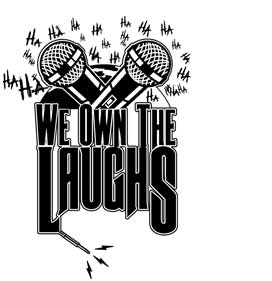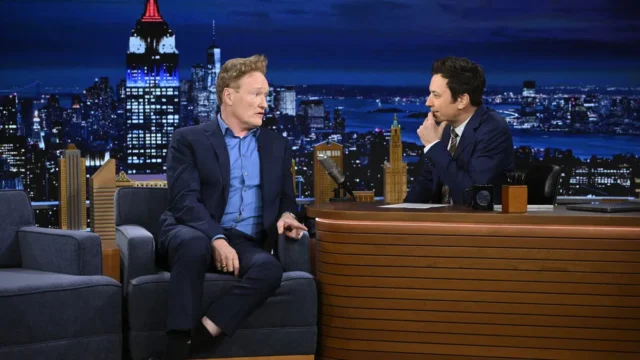Tuesday night saw something that, fourteen years ago, might have seemed impossible: Conan O’Brien returned to “The Tonight Show.” And he was greeted with a standing ovation.
He was there, ostensibly, to promote a forthcoming Max series in which he travels the world meeting fans. But he’d come a long way just to get to 30 Rockefeller Center in 2024, and the interview with current “Tonight Show” host Jimmy Fallon functioned as a peace offering, or a marker of how much time has passed.
O’Brien, after all, exited the program under a cloud in 2010, after a much-followed period of corporate intrigue. Inheriting the show from Jay Leno, O’Brien was set up to fail when NBC programmed a prime-time Leno series, which bombed, as his lead-in five nights a week; O’Brien departed the show after only seven months, at which point Leno replaced him. O’Brien comported himself throughout with a certain pained dignity, but it was hard not to feel that the drama of succession outstripped any comedy he could do.
Which is what made his interview on “The Tonight Show” so welcome, and so surprising. O’Brien acknowledged, in subtle and striking ways, the oddity of the moment, but pivoted the conversation at every turn toward a certain graceful demonstration of gratitude. Describing, for instance, his work on his podcast “Conan O’Brien Needs a Friend,” O’Brien noted that, while he considered hosting a late-night show “the best job in the world,” the podcast format allows him more time with people he admires. It was easy to see that, for him, both were true: That it’s fun to be able to spread out beyond six-minute segments, and that a job he had and lost represented the best time of his professional life.
O’Brien, at 60, is still a mercenary when it comes to finding the joke, and slightly painful observations — like, for instance, that “when someone else is in your studio, it feels weird” — came with an absurdist twist. “The Kelly Clarkson Show,” it seems, now tapes where O’Brien shot “Late Night” before his brief “Tonight Show” ascension, and O’Brien made mention of that feeling strange, before delivering an outsized and sneering version of himself as an ego monster, demanding his old studio be burned to the ground in his absence. The joke erases some of the hurt: It’s O’Brien, in his telling, who’s being a little silly, a little demanding.
And he’s not, not really — what happened in 2010 stank, and he can feel however he likes about it. But say this much for Jimmy Fallon, of whose interviewing style I’ve been critical in the past: While this meeting of late-night fixtures lacked some of the intellectual gravity of the 2022 Seth Meyers-David Letterman interview, Fallon made one shrewd choice, which was to largely cede O’Brien the floor. It became apparent, over the course of the interview, that when Fallon wasn’t sure what to say, he was remaining silent, allowing O’Brien the experience, once more, of piloting a late-night segment. Early in the interview, O’Brien demonstrated what it had looked like when he pivoted his prodigiously tall body out from behind the host’s desk; he crouched near it. He wasn’t quite behind it. But Fallon let him share the space.
And Fallon’s “Tonight Show” is one on which O’Brien would feel welcome. (This is reminiscent of how Fallon rescinded the program’s ban on Joan Rivers, put in place after previous host Johnny Carson felt slighted by her. Leno had honored the ban, but Fallon hosted her some months before her 2014 death.) This is no small thing — Leno’s show, for obvious reasons, never had O’Brien on after 2010, but it wasn’t obvious or intuitive that Fallon would book O’Brien, either. Sometimes, it’s easier just to move on.
But then we wouldn’t have had the sweet, slightly melancholy moment of O’Brien, between old war stories from his long career, mentioning that traveling back to New York brought back what he called “flash memories.” He deflated the moment, slightly, noting that the memories are of absurdist pranks he did on the street, but the point remained: O’Brien had worked hard in his youth to create something, and long after the general public had moved on, it meant something to him, and to whomever else remembers. Late night, when it’s doing something right, can accommodate tonally complicated, emotionally rich moments like this; when host and guest are in sync, they can let the moment hang for a beat before moving on to the next joke. This interview seemed like a punctuation mark on a saga that has hung over O’Brien’s career, and like a reminder of the talent that he has for making great television.



![Live From The Green Room Feat. Damon Williams [Podcast]](https://weownthelaughs.com/wp-content/uploads/2025/06/IMG_1991-238x178.jpeg)
![Alfred Robles “Laugh Now Cry Never” Documentary [Video]](https://weownthelaughs.com/wp-content/uploads/2025/06/IMG_1989-238x178.jpeg)
![Niles Abston “Ass Guy” Comedy Special [Video]](https://weownthelaughs.com/wp-content/uploads/2025/06/IMG_1983-238x178.jpeg)